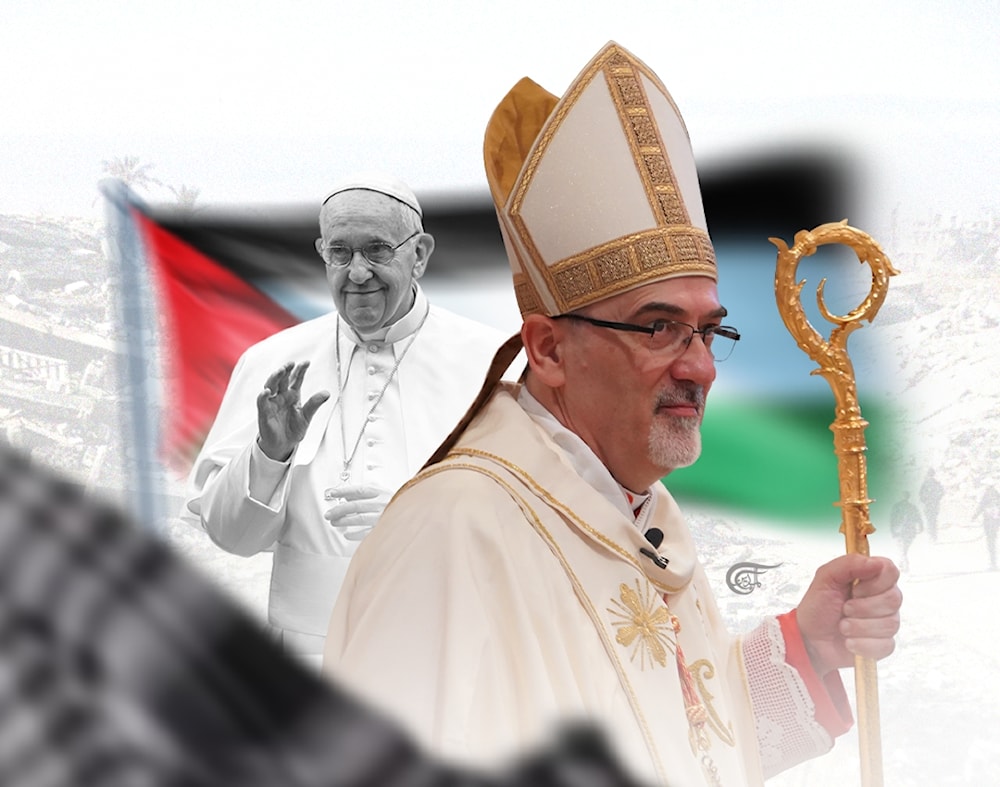Latin Patriarch of Jerusalem could succeed Pope Francis, bring deeper Vatican involvement in the region
If Pierbattista Pizzaballa is ultimately successful, he would be the first modern Pope to have spent so much of his life in Palestine, observing the situation from ground level.
-

While he’s by no means a frontrunner, Pierbattista Pizzaballa is considered among the "papabile", or most suitable candidates under consideration (Illustrated by Zeinab al-Hajj; Al Mayadeen English)
“Israel” chose not to send a high-level delegation to the funeral of Pope Francis on Saturday, April 21. Prime Minister and ICJ-fugitive Netanyahu clearly had no love for the late Bishop of Rome who relentlessly condemned his genocidal offensives throughout the region and made a point of speaking daily to Palestinians trapped in Gaza’s oldest church, right up until his death on Easter Monday.
The Latin Patriarch of Jerusalem, however, did go to Rome, possibly never to return with that title. Pierbattista Pizzaballa was made a cardinal just days before Operation Al-Aqsa Flood, but his high-profile diplomacy and distance from Vatican politics make him a serious contender to sit on Saint Peter’s throne.
An office born in bloodshed
The office of the Latin Patriarch was established in the late eleventh century, after the First Crusade ended in the Frankish conquest and sacking of Jerusalem, with tens of thousands of its inhabitants slaughtered. While the Patriarch was subordinate to the ruler of the newly established “Kingdom of Jerusalem” and the other Frankish Crusader states in the region, he was the direct representative of the Pope in Rome, whose spiritual (and notionally secular) authority overruled that of all Catholic monarchs.
With the final defeat of the Crusader states in the late thirteenth century, the Latin Patriarchate was relocated to Cyprus. The office then went into a long period of dormancy during which it was a mostly honorific title held by the Pope. During this long interlude, the Holy See bestowed responsibility for maintaining the Christian holy places on the Franciscan Order, whose head friars were styled ‘Custodian of the Holy Land.’
In the mid-19th century, the Latin Patriarchate of Jerusalem was reestablished in Palestine as an episcopal see, with the permission of the Ottoman Sultan.
A meteoric rise
While the Crusaders are long gone, their spiritual and ideological descendants have returned to enact the same political project, with the same callous savagery, albeit with modern weaponry and on a scale undreamt of in the Medieval period.
In September 2023, just days before Operation Al-Aqsa Flood and the start of the Gaza genocide, the late Pope Francis elevated Pierbattista Pizzaballa to the college of cardinals, the body which elects the head of the Roman Catholic Church. In addition to being a former Franciscan Custodian of the Holy Land, Pizzaballa is the first such officeholder to become a contender for the Church’s highest office.
Although only 57 upon his elevation, the cardinal was thrust into global prominence by the slaughter of Gaza. He publicly offered himself as a substitute for Israeli captives and approved the suspension of Christmas festivities in solidarity with the people of Gaza. He also openly donned the Palestinian koufiyyeh, an act for which protesters in the West are increasingly arrested.
He has described the war on Gaza as a “watershed” in interfaith relations, after which nothing can be as it was before. Perhaps just as crucially, in political terms, he has suggested that the "two-state solution” so endlessly invoked in the West is no longer viable, though without outlining what he thinks should replace it. Whether that view would inform Vatican policy if he were Pope is another question, though the mere possibility would be enough to unsettle Tel Aviv.
With the death and funeral of Pope Francis last week, Cardinal Pizzaballa will now participate in the ancient ritual of the conclave. While he’s by no means a frontrunner, he is considered among the "papabile", or most suitable candidates under consideration.
His lifelong distance from the Vatican has left him a record unmarred by scandal or factionalism, positioning him as an ideal compromise candidate if the initial ballots do not yield a victor. His long-standing ties to Jerusalem and familiarity with the innate religious pluralism of the region also make him perhaps the best-placed candidate to continue Francis’ agenda of dialogue with other churches and religions.
Politically, given the nature of his office, he has prioritized neutrality. In his tenure as ‘Custos’, he described his initial priority as “interaction with the Jewish world,” suggesting an emphasis on engagement with “Israel". He also condemned the operations of Hamas, especially regarding October 7. However, as Patriarch, he has spoken of the Palestinians as “still waiting for their rights, freedom or recognition.” Even such a mild statement as this would be enough for Tel Aviv to view him antagonistically, however sincerely neutral he may be.
An even-handed diplomat?
One of the advantages of his candidacy is that his ideological leanings are largely unknown. His views on certain contentious doctrinal questions are ambiguous, allowing him to appeal to both ‘traditionalist’ and ‘progressive’ wings of the Church.
If he is ultimately successful, he would be the first modern Pope to have spent so much of his life in Palestine, observing the situation from ground level. Whether he would be a strong voice for the region’s peoples (including Christians) under bombardment and occupation is yet to be seen. But he will have spent more than enough time among them to recognize the true threat to his flock’s continued existence.

 Samuel Geddes
Samuel Geddes
 5 Min Read
5 Min Read











